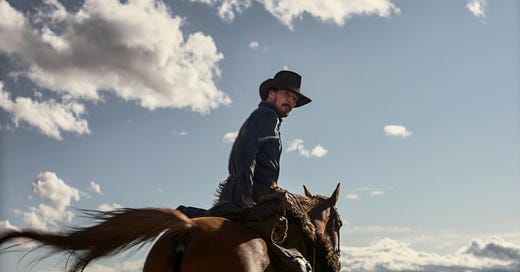The Power of the Dog
Jane Campion's first feature film in 12 years is a disquieting meditation on power, sexuality and ownership, featuring Benedict Cumberbatch in a masterful performance sure to divide.
Please consider supporting Film Yap with a subscription to enjoy all our content plus exclusive opportunities!
First, a caveat: most of the time I write a review within short order after seeing a film. And I strongly prefer not to watch anything else before writing: movie, review, movie, review. It’s just how my brain works best.
But I saw “The Power of the Dog” more than a month ago in the rush of Heartland Film Festival, with countless other movies since, and haven’t had an opportunity to put thoughts to word since then.
(Or cajole another critic into penning this review.)
That said, I found the Western from writer/director Jane Campion (“The Piano”) compelling enough and distinct enough to linger sufficiently in the memory. It’s the sort of film that perhaps doesn’t make a huge impression on you at first, but as you sit with it becomes richer and more interesting, not less.
That’s a rare enough cinematic animal these days.
Benedict Cumberbatch stars in what is bound to be a divisive role as Phil Burbank, a rancher in 1925 Montana who along with his brother, George (Jesse Plemons), runs the successful cattle concern started by their father. They’re throwbacks grasping on to the last gasp of the Old West, a place where cars are becoming more commonplace but cattle-and-horse are still king.
Phil is a right nasty piece of work. He is the undisputed leader of the ranch operation who insists that all knuckle under to his every command and whim. George, meanwhile, is retiring and plainly pleasant, almost defined more by the absence of a personality than any you could describe.
Phil revels in his filthy appearance and cussed language, tromping around in crust-caked boots in the mansion their dad built in the middle of the prairie. But he is a self-contradicting anachronism, as we’ll learn, a Princeton-educated man of letters who rejected East Coast refinement for the tutelage of Bronco Henry, the revered old ranch hand who schooled him in the ways of the cowboy and whose widowed saddle sits like a sacred shrine in the main barn.
In turn, the young ranch hands look up to Phil like a minor deity, the sort of man’s man who can stride into town to treat them to steaks at the only restaurant and demand silence from gentrified folks partying it up with the newfangled player piano.
Phil wears his black hat like a crown.
Things probably would’ve played out this way to the end of the brothers’ days until George quietly woos and weds Rose (Kirsten Dunst), the proprietress of said establishment. In short order, Rose is brought in to Phil’s world, an entrance he considers an invasion, made worse so by the presence of her teen son, Peter (Kodi Smit-McPhee), a lanky, sissy-fied drink of water who wants to study to be a doctor.
There’s a terrific scene where Peter, dressed in a ridiculous amalgamation of the cowboys’ gear, wanders around their camp and is mocked at every turn, but seems not to hear. Phil encourages the abuse but, in attempting to embarrass the boy for his lack of range skills, oddly ends up becoming his tutor.
Meanwhile, Phil engages in a menacing ongoing campaign of psychological torture of Rose, who is left alone for long stretches while George is away on business. It’s less about what he does than the dead-eye looks of pure hate he’ll cast her way. She takes to drink, which Phil sees as just another weakness to pick at, and things grow more and more desperate.
The story, based on the novel by Thomas Savage (unread by me), starts out as a compelling meditation on power and ownership. Phil sees himself as the lord of all he surveys, with George as the necessary adjacent, lesser power. The mere fact that George has enough sense of independence to marry himself off and bring interlopers into the established dynamic is enough to set him off.
Things grow a bit staler in the last act, as the story wanders into explorations on sexuality and how they intertwine with the twisted power dynamic. Without giving anything away, it’s material that probably seemed fairly shocking and intriguing in 1967 when the novel came out. But here it winds up registering more as an important character’s “gay suffering.”
The relationship between Phil and Peter, in particular, seems like a teasing dance neither really wants to engage in, but the circumstances that throw them together more or less demand they perform it.
It’s been a minute — 12 years, to be exact — since Campion directed a feature film, which seems like yet another example of Hollywood not knowing what to do with a strong, singular female voice. She’s made a starkly beautiful film, as the gorgeous Montana backdrops (New Zealand, actually) contrast with all the human ugliness in the foreground.
Cumberbatch is malevolently terrific, drawing a portrait of manhood that’s terrifying and majestic yet also crimped and self-defeating.
Phil has made for himself a world of his own based in antiquity with a pantheon of figures and values to be worshiped, with he ensconced as the high priest. The external forces threatening that order — industry, machines, womenfolk — are enemies to be opposed and thrown down.
Ultimately, he’s a man who puts on a brave face but is consumed by fear, and an unwillingness to steer his hardbitten gaze inward.





